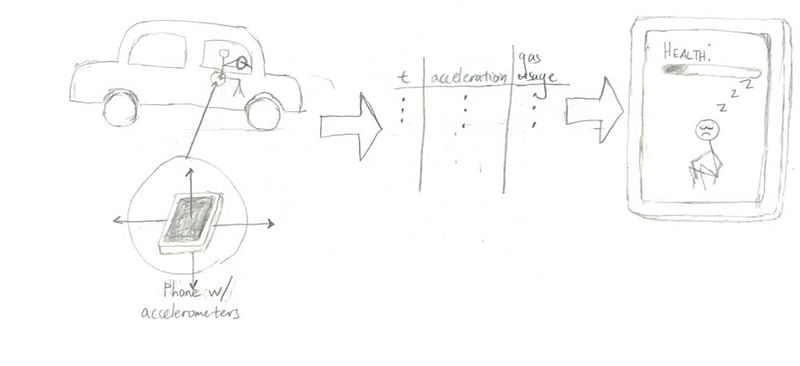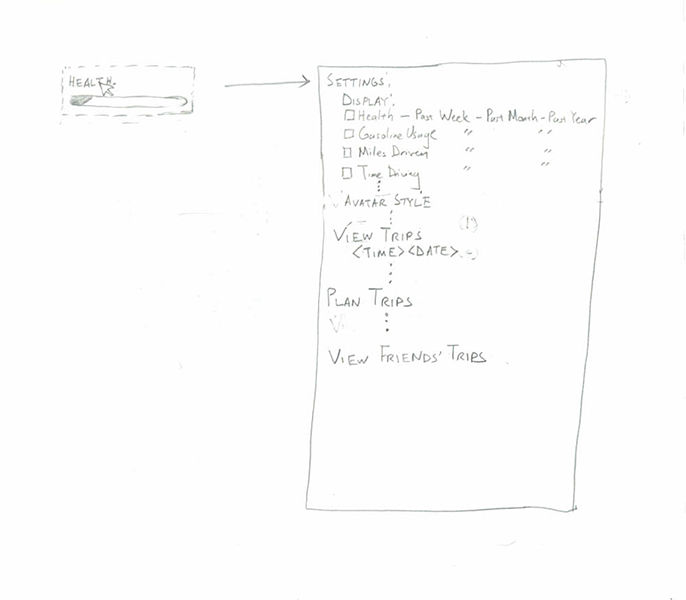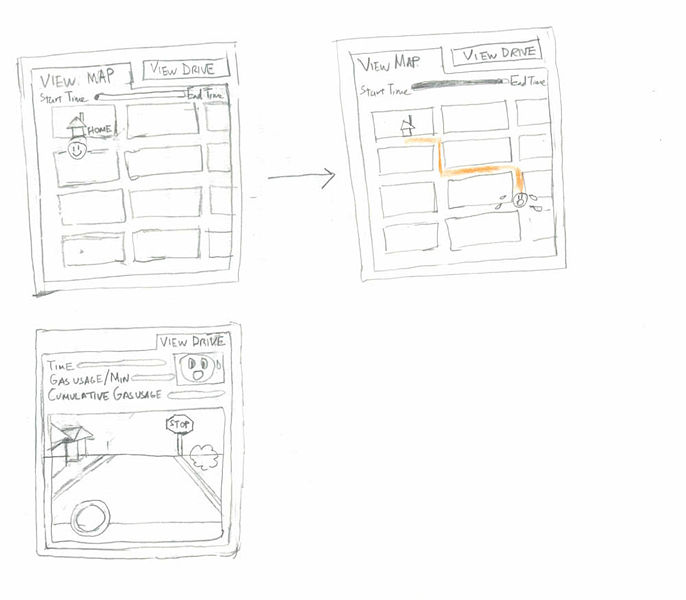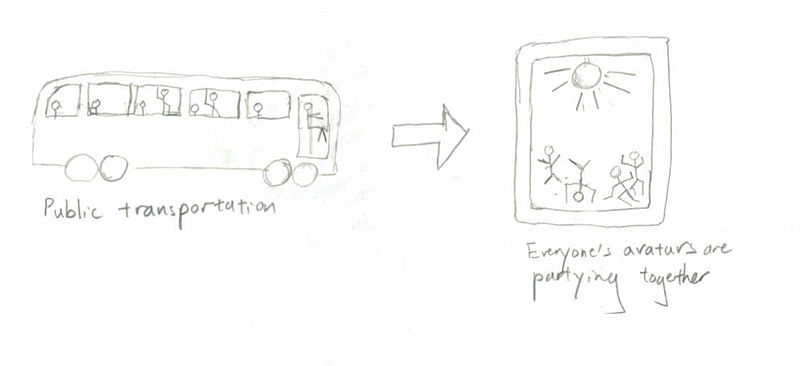Group Brainstorm-Group:TBD
From CS 160 Fall 2008
Contents |
Team Members
Brainstorm List
- 1. Set goals
- 2. Social networking/Competition (through facebook competition)
- 3. Board game
- 4. Interfacing with something like SIMS - artificial money
- 5. Categorize by cars
- 6. Read real world data
- 7. Fantasy car in game (e.g. fantasy dragon)
- 8. Enterprise network
- 9. Can design increasingly fancy fantasy cars based on real achievements.
- 10. Incorporate other areas of life for fantasy skills (studying)
- 11. Monetary rewards
- 12. Racing game - do something, move forward in board game.
- 13. Puzzle games
- 14. Strategy games
- 15. Have a noxious smell in your car if you drive too much.
- 16. Monopoly style game - if your real life house is energy efficient, your Monopoly house has a higher value.
- 17. Puzzle figuring - graph search style of minimizing gas to achieve a certain distance.
- 18. Develop different maps with harder and harder configurations.
- 19. Having a dance interface. Amt that you run is associated with distance travelled or gas used.
- 20. Certain types of driving leads to greater gasoline usage, therefore a Device is placed on the car that measures acceleration, speed, etc, and reports back to user on his performance is and how to improve it, compared to other drivers. Can be integrated into different types of games. The device can also measure performance of surrounding cars to compare with.
- 21. Archetype comparator, choose a particular type of gasoline/home utilities persona and try to beat him/her
- 22. Display amount of gas used during certain routes on a map, to help visualize driving style.
- 23. Augment racing game such that your virtual car is at a disadvantage in certain areas of a map based on real geographies because you use too much gas in those areas of in real life.
- 24. Overlay a map of typical routes during driving with a map with public transportation routes.
- 25. Visualize the driving regions of your friends (through facebook or similar social network); help increase chance of carpooling or taking walks for fun/socializing purposes.
- 26. Have alternate reality game with strategies about gas efficiency of different game pieces.
- 27. Conserving energy in real life can translate into conserving energy (health points) in game.
- 28. Monetary reward for best conserver in a certain time (month, week?)
- 29. Have a character on your car whose behavior gives you immediate feedback on your driving style (integrated with #20).
- 30. With increasing gas usage, health of character deteriorates.
- 31. Have feature that helps identify gas stations with cheaper prices.
- 32. Use map overlay to communicate with a GPS/Android device to access it at any given time.
- 33. Use three interfaces - Facebook, GPS, simple website.
- 34. Be able to implement more elaborate features on your fantasy car to serve as a reward in real life.
- 35. For website/facebook - if you are lacking a GPS, have your avatar be a visual display of your condition.
- 36. Augment avatar character's abilities such that you can have races/fights where the outcome is based on your gasoline usage.
- 37. Manually record gasoline usage into website so that people without a GPS system can participate.
- 38. Utilize sound instead of a visual character to keep game in background (ie, negative sounds on Pandora or cacophonous instruments vs favorite songs or melodies.
- 39. Increasingly elaborate melodies as gas usage decreases; can incorporate symphonies when taking bus or carpooling (because of multiple people in the same area).
- 40. Rank health/power of your avatar with respect to other users (in your city or in your network).
- 41. Use face or character on a map to indicate location of the car.
- 42. Instead of GPS/instantaneous feedback - have an ongoing character status that you view each time you look at your phone.
- 43. Give character a friend if you carpool.
- 44. Be able to replay video of your avatar during your previous drive such that you can visualize how your drive affects his behavior.
- 45. Use a pathfinder to be able to map the shortest path.
- 46. Update the shortest path with also expected driving conditions, unevenness of road, etc.
- 47. Your avatar has a friend if you carpool.
- 48. Use iPhone style accelerometers to keep track of speed/distance.
- 49. Upon reviewing videos of your avatar's behavior (44), can regain ~1/2 of the energy points you lost by playing a virtual driving game w/ keypad (over same distance, but with a driving style more conducive to gas conservation).
Idea Selection
We generalized our ideas from the individual project proposal into four categories: reducing gasoline usage, simulating driving, career planning and organization/planning. We finally chose to focus on building a serious game centered on reducing gasoline usage. While the other ideas are equally interesting, global warming and limited gasoline usage are critical issues particularly in the United States and a serious game may have a potential to encourage resource-conserving behavior. Our background research also indicates that not many serious games are devoted to resource conservation, which makes this an underdeveloped niche of serious games that has a lot of potential for innovation.
Our idea for a serious game also takes into account the fact that conserving gas is both a long term goal and a short term goal, as both different driving styles during a trip or frequency of driving over a long time period can lead to different rates of gas consumption. We found ourselves consistently returning jumping back to and building on the idea of an avatar on a mobile device, as there are several features of this idea that make it a suitable game for the problem - the mobile device allows a direct correlation between real world data and game elements, an avatar can provide both short term and long term feedback as it exhibits emotions or grows over time, and the cell phone facilitates networking for cooperative (carpooling) and competitive (gasoline-usage based rankings) purposes.
Proposal
Target User Group
Our target user group would be anyone who drives regularly or for lengthy periods of time, as those people (male and female) would be interested in saving gas, and in turn, save money. The economic status of our users could range anywhere from lower class to upper-middle class, as long as they own a cell phone. We hope to appeal to teenage drivers in particular, as they are typically reckless and therefore drive in a way that consumes more gas than necessary; in addition, the game component makes learning the proper driving behaviors much more appealing to them. In other words, all drivers (except for those who don’t care about gas prices or the environment) would benefit from playing our game. This game would also appeal to energy conservationists and anybody who is concerned about rising gasoline emissions in our environment.
Problem Description
Driving a car has recently become both increasingly expensive, as a result of rising gas prices around America, and hazardous to our ecosystem, as a result of its production of carbon dioxide and poisonous gases. While public transportation is one solution, gas usage among current drivers can also be mitigated by encouraging efficient driving or carpooling.
Problem Context
With global warming now a real threat, people must be encouraged somehow to reduce the amounts of greenhouse gases that they introduce to the environment. One specific area in which this can be done is gasoline usage. For every gallon of gasoline burned, about 20 pounds of carbon dioxide, one of the major greenhouse gases responsible for global warming, gets released. What are some of the things that people do that wastes gas? Driving too fast may result in extra and unnecessary gasoline consumption, and can be remedied with a constant reminder about the impact of different driving styles. People may drive by themselves for work or pleasure, and may often not be aware that someone they know might be driving in the same route. These problems must be solved in the game that we propose. Currently, no other serious games exist that address these problems.
Why Serious Games are a Good Technology for the Problem
It is difficult for people to always keep long term goals such as the environment or saving money on gasoline in mind when doing everyday things. However, people are more used to thinking about things that might affect them immediately such as a score in a game, which is an instantaneous and immediate feedback that has a tangible and deterministic correlation with the present factors. That is the concept behind the serious game solution that we have proposed. In our case, however, the user’s score is reflected in the health of a character that is associated with the user, which provides not only instantaneous feedback, but also conveys information about the problems with a particular aspect of gas usage in a visceral and intuitive medium.
Solution Sketch
The game will be a mobile application that will use a cell phone that is within the car to sense the way you are driving with an internal accelerometer and based on that calculate how much gas you are utilizing/wasting. The purpose of the game will be to maintain/improve the health of your avatar and compare your performance with that of your friends.
Avatar Health Corresponds to Gas Usage
The cell phone will constantly collect data while in the car. This data is accumulated within the application and the user can review it after the drive is over. Your driving behavior corresponds with the avatar's health. If you brake or accelerate too much the avatar will have poor health, and if you drive properly then your avatar will have good health. The application will allow you to add the trips that you will be taking in the future. Your friends who also have this application will list their own trips. With a GPS system, the application will be able to check if your friends have similar routes, which can allow the user to carpool. Carpooling will automatically increase the avatar's health. You can look at the history of your avatar's health, and see how each trip transformed your avatar's health.
Review Driving Behavior
You can look at the way you have been driving over a given period of time. Based on that you can see how your avatar transformed over time. This allows the user to get a general idea on how to improve their driving so as to reduce gasoline usage.
Interactions with Other Avatars
You can choose to car pool with your friends or use public transportation together by possibly calling or texting them after seeing in your application that they are taking a similar route. This will correspond to an increase in you and your friends' avatars to increase in health/happiness. The avatar will know that you are car pooling or using public transportation by sensing the location of the other avatar/mobile phones.




